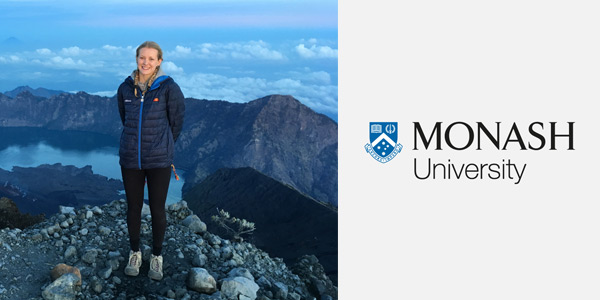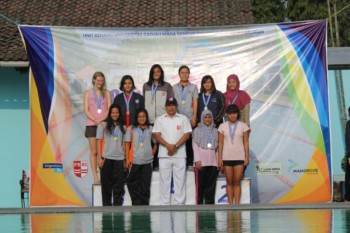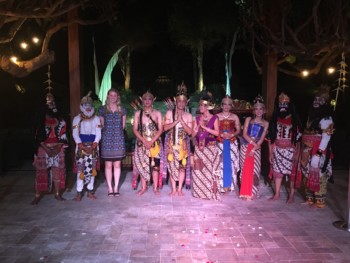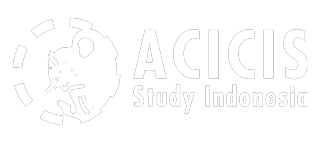
Rebekah Baynard-Smith is a 2017 New Colombo Plan Mobility Grant recipient from Monash University. Rebekah completed the Development Studies Immersion Program at Gadjah Mada University in August-December 2017.
Q: Why did you decide to undertake the ACICIS program?
DSIP is such a comprehensive program – you fit in so much in just one semester! With its focus on language learning, and hands-on engagement through the development field trips and the placement, I knew it would be a unique opportunity to put into practice what I have learned about development so far and of course learn so much more through immersive cross-cultural experiences and professional opportunities. It was a no-brainer for me and I am so grateful for the opportunity.
Q: What classes are you currently enrolled in?
The first 6 weeks of DSIP I completed the beginner Bahasa Indonesia course at UGM: reading, writing, conversation, vocabulary and grammar. The beginner students were also assigned a one-on-one tutor to meet with us for an hour each day, which was very beneficial. My tutor became a friend that I still see now even during my internship!
I also do language classes at a private language school once a week which is helping to keep up my skills alongside my internship.
Q: Are you involved in any clubs/societies at the university?
Yes! At the clubs and societies fair I signed up for swimming straight away. Since the initial trials, I have been training with them twice a week and also competing in national and inter-faculty competitions. It is a very social group that always love to eat together after training, have banter on Line (social media App) and social events like movie nights and sleepovers. They have been very welcoming and friendly towards me (the only bule in the group) and I have learnt a lot of Indonesian slang from them!
Q: How will the Development Studies Immersion Program influence your future career or study?
Having been immersed in the Indonesian culture and language whilst gaining first-hand experience of development practice here, I hope to be able to continue along this path. In future studies or jobs, I will do my best to ensure development in Indonesia is a feature!
Q: How does development in Indonesia differ to what you’ve seen before?
What has stood out most to me about development in Indonesia (from what I have seen so far) is that for the most part there is a lot of drive and motivation – people convey a push to keep improving themselves and their communities, even in the face of opposition or obstacles. This ambition is really inspiring and has meant that development projects are undertaken with passion and they are fun! I have really enjoyed seeing groups of men, women, different age groups, religions and social status come together to fight for development issues. Indonesia is such a unique setting for development work because of its governance structure, history, mix of religions, tradition, globalization and modern technology. I have really enjoyed learning about the inter-connections and challenges and hope to learn so much more!
Q: What do you like to do in your spare time in Yogyakarta?
In Yogyakarta there is so much to do! It’s very easy to be busy all the time. I have weekly things on like private language classes, swim training, social badminton, and Indonesian church on Sundays. Then I try to fill in the gaps with hanging out with friends (jalan-jalan) and things around Yogya like cultural centres/museums and adventure places (flying foxes, tubing etc.). I have also done various volunteering things in my spare time – English classes with children through an NGO, English activities with teenagers at an Islamic Boarding School.
Q: Are you undertaking an internship while in Indonesia?
Yes! As part of my DSIP we have the opportunity to undertake an eight-week internship with a local NGO related to a development issue we are particularly interested in. I am doing mine at Yayasan SHEEP Indonesia, an organisation that works around the country on issues of health, education, environment and peace. My activities have so far included in-depth research into eco-tourism and disaster risk reduction in villages about an hour out of Yogya. This has meant living with locals for several days at a time, many meetings with local government officials and taking part in regular village activities.
Q: What is your favourite food/place to eat?
My church friends once took me to a ‘Sate Padang Asli’ place near my Kos; it is now my favourite dish food in Indonesia. I have dragged many friends along with me when I am craving it and they have pretty much been converted too. It is basically sate kambing (goat), longtong (rice cake), crackers and a delicious and spicy sauce/curry over the top. Enak sekali!
Q: What is your favourite Indonesian word/phrase:
‘Ora opo-opo’ / ‘Orapopo’ – don’t worry/it’s ok in Javanese! I kept hearing it at the badminton Junior World Championships as the crowd would chant it out when an Indonesian player lost a point. Been saying it ever since!!
Q: What places in Indonesia have you visited during your semester so far?
Lombok (incl. climbing Mt. Rinjani).
Solo/Surakarta
Central Java (Owabong and Semarang)
Many places around Yogyakarta province – from Mt Merapi through to the beach basically!


